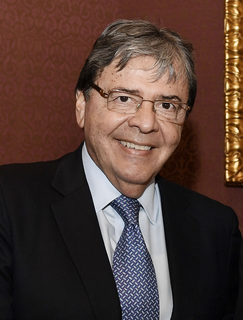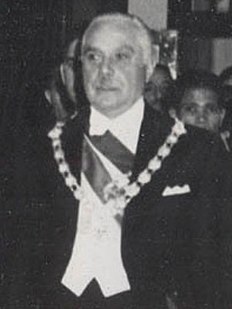Honduras was already occupied by many indigenous peoples when the Spanish arrived in the 16th century. The western-central part of Honduras was inhabited by the Lencas, the central north coast by the Tol, the area east and west of Trujillo by the Pech, the Maya and Sumo. These autonomous groups maintained commercial relationships with each other and with other populations as distant as Panama and Mexico.

The Alberta general election of 1917 was the fourth general election for the Province of Alberta, Canada, held on 7 June 1917 to elect members of the Legislative Assembly of Alberta.

Victorino Márquez Bustillos, was a Venezuelan lawyer and politician, and was provisional President of Venezuela from 1914 to 1922. Although Bustillos was elected by Congress, General Juan Vicente Gómez remained the real power behind the presidency. Victorino Márquez died in Caracas on 10 January 1941, aged 82.

The Alliance for Progress is a Peruvian conservative-liberal political party founded on December 8, 2001 in Trujillo by Cesar Acuña Peralta. At the legislative elections held on 9 April 2006, the party won 2.3% of the popular vote but no seats in the Congress of the Republic.

Julián Trujillo Largacha was a Colombian lawyer, statesman, General of the Army and President of Colombia from 1878 to 1880.

The Dominican Civil War took place between April 24, 1965, and September 3, 1965, in Santo Domingo, Dominican Republic. It started when civilian and military supporters of former President Juan Bosch overthrew acting President Donald Reid Cabral. The coup prompted General Elías Wessin y Wessin to organise elements of the military loyal to President Reid, known as loyalists, initiating an armed campaign against the so-called constitutionalist rebels. Allegations of foreign support for the rebels led to a United States intervention in the conflict, which later transformed into an Organization of American States occupation of the country. Elections were held in 1966, in the aftermath of which Joaquín Balaguer was elected into the presidential seat. Later in the same year international troops departed from the country.

Jacinto Bienvenido Peynado Peynado was the President of the Dominican Republic from August 16, 1938 until February 24, 1940 during the Trujillo Era. During his 31-year regime, dictator Rafael Trujillo appointed four individuals to serve as ceremonial Presidents while retaining direct, behind-the-scenes control of the Executive branch. Prior to ascending to the Presidency, Peynado served as Trujillo's Vice President from 1934 to 1938.

General elections were held in Mexico on 7 July 1952. The presidential elections were won by Adolfo Ruiz Cortines, who received 74.3% of the vote. In the Chamber of Deputies election, the Institutional Revolutionary Party won 151 of the 161 seats. These were the last presidential elections in Mexico in which women were not allowed to vote.
The St Albans by-election of 1943 was a parliamentary by-election held in England in October 1943 for the House of Commons constituency of St Albans in Hertfordshire.

General elections were held in the Dominican Republic on 16 May 1934. Two years earlier, the Dominican Party of President Rafael Trujillo had been declared the only legally permitted party. However, the country had effectively been a one-party state since Trujillo assumed office in 1930.

General elections were held in the Dominican Republic on 16 May 1942. Rafael Trujillo was the only candidate in the presidential election and was elected unopposed, whilst his Dominican Party won every seat in the Congressional elections. They were the first elections in Dominican history in which women could vote.

General elections were held in the Dominican Republic on 16 May 1947. For the first time since the 1924 elections there was more than one presidential candidate. However, the incumbent Rafael Trujillo remained in power after receiving 93% of the vote. His Dominican Party won every seat in the Congressional elections.

General elections were held in the Dominican Republic on 16 May 1952. Héctor Trujillo was the only candidate in the presidential election, and was elected unopposed, although his predecessor and brother Rafael Trujillo maintained absolute control of the country. The Dominican Party won every seat in the Congressional elections.

General elections were held in the Dominican Republic on 16 May 1957. Héctor Trujillo was the only candidate in the presidential election, and was elected unopposed, although his predecessor and brother Rafael Trujillo maintained absolute control of the country. The Dominican Party won every seat in the Congressional elections.

Presidential elections were held in Colombia on May 25, 2014. Since no candidate received 50% of the vote in the first round, a run-off between the two candidates with the most votes took place three weeks later on June 15, 2014. According to the official figures released by the National Registry office, as of May 22, 2014 32,975,158 Colombians were registered and entitled to vote in the 2014 presidential election, including 545,976 Colombians resident abroad. Incumbent president Juan Manuel Santos was allowed to run for a second consecutive term. In the first round, Santos and Óscar Iván Zuluaga of the Democratic Center were the two highest-polling candidates and were the contestants in the June 15 run-off. In the second round, Santos was re-elected president, gaining 50.95% of the vote compared with 45.00% for Zuluaga.

General elections were held in Belize on 4 November 2015 to elect members of the House of Representatives. On 28 September 2015 Prime Minister Dean Barrow announced that he had advised the Governor-General to dissolve the National Assembly and to fix Wednesday 4 November 2015 as the date for the next general elections.

Presidential elections were held in the United States of Colombia in 1878. The result was a victory for Julián Trujillo Largacha of the Liberal Party.

Carlos Holmes Trujillo García is a Colombian dynasty politician, diplomat, scholar and attorney, and his country's current foreign minister. Previously in his career he was mayor of Cali, Colombia's ambassador to the Organization of American States (OAS) and numerous countries.

Early presidential elections were held in the Comoros on 24 March 2019 alongside regional elections. If required, a second round will be held on 21 April.















